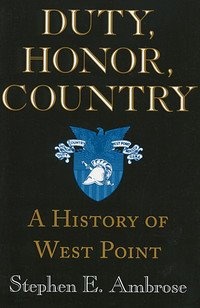Duty, Honor, Country: A History of West Point

A little diversion here - in the line of my historical reading, I suppose, but perhaps a bit out of order. Or perhaps not, depending how you look at it. West Point was founded in 1802, so it's founding fits in my current time period, I suppose...
Anyway, I've been diverting quite a bit from my reading plans, as you may have/will notice. I've agreed to write a series of articles/reviews on American authors for The Hub - the Mark Twain piece was the first. Others will include Anne Bradstreet, Thomas Paine, and Nathaniel Hawthorne & the Peabody Sisters (one was his wife). So, some history, but not in my prescribed order. The James Madison bio has been set aside - again! - as I work on these articles & read some children's books in between for a break.
West Point has nothing to do with American authors (except that Edgar Allan Poe was briefly a cadet there); this one was pure pleasure reading. I'm not sure why it appealed to me, but I've been intrigued by West Point & other military academies since reading John Jakes's North and South in high school. I was really into Civil War history at that time (the colonial period interests me more now), and the idea that so many great men of the War Between the States were at West Point at the same time amazed me. (Coming soon on my list to read is a book about this exactly: 1846 by John C. Waugh.)
Stephen Ambroses's history of West Point didn't disappoint; I sat down and read the entire thing in one evening, even devouring chapters between innings of the All-Star Game. The story of the US Military Academy's history is also the story of the US, the US Military, and the history of education in this country. I thought the chapters about the early years were most interesting, and I learned much about higher education in the early 19th century. At the time of West Point's founding, all other colleges in the country were still providing a classical education rooted heavily in the study of Latin and Greek and capped by moral philosophy - a curriculum designed to educate ministers as well as a few lawyers. West Point, from it's very inception, was something very different. An engineering school with a goal toward training military officers, the courses at West Point were unlike those taught anywhere else. West Point instructors were covering ground so new they were often forced to write their own textbooks. In the first half of the 19th century, West Point become one of the premier educational institutions for young men in the US, as evidenced by the success of it's graduates.
The second half of the 19th century was less kind to West Point; in an effort to preserve past glory days the curriculum and instruction stagnated. That is, until a new superintendent arrived with a host of new ideas - Douglas MacArthur stepped in and turned West Point on it's head during his brief time in charge. These years were the first in a time of reform for West Point, resulting in an integration of modern military technology and a complete overhaul of the curriculum.
The book was originally written in 1966, but an afterword was added in the 1990s that brings much of the history up-to-date. Unfortunately, Ambrose did not write the afterword, and the last few decades of happenings sorely miss his interesting and accessible writing style. While I was enthralled through the entire book, I found myself skimming the afterword, despite it's discussion of the advent of elective courses at West Point (a huge break from tradition) and the admittance of women as cadets. Still, the "boring" afterword was a small issue when the rest of the book was so well done.
Ambrose, Stephen. Duty, Honor, Country: A History of West Point. Baltimore, Johns Hopkins University Press, 1966.
What I'm reading: The Trouble With Tom by Douglas Phillips and the Green Knowe series
On my bookshelf: 1846; The Peabody Sisters, Hawthorne in Concord, and stacks of Edward Eager & E. Nesbit books

0 Comments:
Post a Comment
<< Home